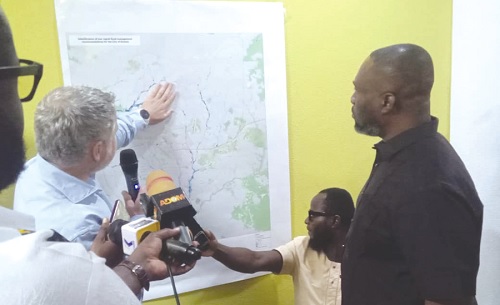
Govt initiates studies to tackle Kumasi’s perennial flooding
The Ministry of Works, Housing and Water Resources, with support from the World Bank, has initiated two critical technical studies to address perennial flooding in Kumasi in the Ashanti Region.
The studies involve basin-level flood risk assessment and community-specific vulnerability assessment.
For the first study, Messrs Deltares from the Netherlands has been engaged to undertake a strategic, basin-level flood risk assessment on three key urban watersheds – Sisan, Wiwi and Aboabo.
The study will identify areas at risk from both fluvial and pluvial flooding and recommend short, medium and long-term mitigation strategies based on hydrological modelling and spatial analysis.
The second study will involve Messrs INES Ingenieros from Spain conducting a community-specific vulnerability assessment focusing on informal settlements of Aboabo and Asawase.
It will evaluate flood-prone transportation routes, identify both structural and non-structural vulnerabilities and also develop a participatory climate resilience plan that will reflect the lived experiences of the affected communities.
The outcome of the studies would inform the design of a comprehensive flood mitigation project for Kumasi and its surrounding areas.
Current challenge
In Kumasi, due to rapid urbanisation, there is proliferation of settlements in flood-prone areas along streams and wetlands, particularly within the metropolis and its adjoining municipalities.
Similarly, poor municipal solid waste collection and disposal have further compounded the problem, resulting in waste accumulation in drainage channels and tributaries, which significantly reduces the discharge capacity of drains.
All these factors, coupled with weaknesses in urban drainage network and the mounting impacts of climate change, have left Kumasi increasingly vulnerable to flooding.
As a result, over the past five to 10 years, Kumasi has witnessed a worrying rise in flood-related fatalities, loss of property and severe disruptions to commercial and industrial activities.
Validation workshop
At a stakeholders’ validation workshop in Kumasi in the Ashanti Region yesterday, the Minister for Works, Housing and Water Resources, Kenneth Gilbert Adjei, said the move formed part of the government’s reset agenda to improve urban resilience and safeguard livelihoods.
He stressed that “In line with President Mahama’s reset agenda, we are taking decisive steps to provide long-term solutions to flooding in Kumasi.”
The minister explained that the findings from both studies would be used to develop the Kumasi Resilient Project, a major initiative aimed at safeguarding the city from recurring flood disasters for the benefit of the people.
Implementation
Mr Adjei pledged to ensure the timely and effective implementation of the recommendations that would emerge from the studies, saying “the successful completion of these studies will provide the basis for further dialogue with the World Bank on prioritising interventions and securing the capital investments needed to protect lives, livelihoods, and infrastructure in Kumasi.
“Our vision is to have a climate-resilient Kumasi that not only safeguards its citizens but also preserves its identity as the garden city of Ghana,” he said.
A Senior Urban Specialist at the World Bank, Santiago Arias, pledged the bank’s support for the initiative and further urged the alignment of the technical efforts with a political will to address the problem.
In a brief presentation, a Senior Advisor, Inland Water Systems, Deltares, Bobby Russel, expressed concern that annually a whopping $89m investment is lost due to flooding in Kumasi, which is projected to reach $220m by 2050.
He said: “If nothing is done about it, the problem is going to get worse, which will be a huge cost to the nation”, adding that the intervention was not about replicating what had been done elsewhere but finding solutions that were really appropriate.
The Ashanti Regional Minister, Dr Frank Amoakohene, underscored the importance of the workshop as it sought to generate practical, sustainable and cost-effective flood management interventions for the region.
Writer’s email:
